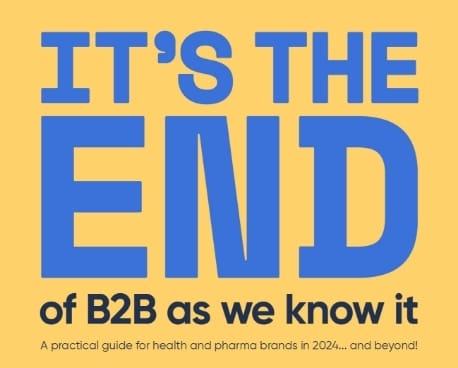As digital technology continues to evolve, this opens up new and exciting ways for healthcare providers to connect with their patients. No longer are local reputation and word-of-mouth referrals the only driving forces. Instead, more direct digital marketing strategies are allowing healthcare providers to reach prospective patients with innovation and technology.
One example of this is retargeting – a powerful approach that allows you to connect with individuals that have shown an interest in your healthcare services. However, while this may sound simple on the face of it, retargeting requires sensitivity, logic and intricate handling. When done well, it can be a highly effective digital marketing tool. But when done badly, it could have serious consequences.
In this blog, we’ll guide you through the need-to-knows of healthcare retargeting, including how it can be used to grow and convert your leads and how to avoid compliance conundrums.
Retargeting: the basics
In simple terms, retargeting is a strategy that helps you stay connected with individuals who have shown interest in your healthcare services.
Given that only a small fraction of initial visitors – approximately 2-3% – actually convert on their first visit to a website, retargeting allows you to reach out to a patient who has visited your website but didn’t take action and gently nudge them in the direction of converting; for example, prompting them to make an appointment or download a resource.
Retargeting operates using a simple code, often referred to as a pixel, which is placed on your website. This technology uses cookies to track your website visitors as they continue to surf the web, allowing your ads to appear on any other websites they visit later on.
The challenges of retargeting in healthcare
As you might expect, it’s important to be mindful of privacy rules and regulations when retargeting in healthcare, abiding by guidelines set by regulatory bodies like the ASA, GMC and BMA, as well as various advertising platforms.
Imagine adverts relating to some personal symptoms you had Googled showing up later on your family computer…
When creating retargeting content, it’s essential to create content which is both engaging but suitably non-specific, ensuring that it does not imply any prior knowledge of personal medical information, which could lead to a breach of user confidentiality and trust and risk a breach of guidelines.
Other retargeting challenges in healthcare include navigating the retargeting regulations of Facebook and Google – two major platforms commonly used for retargeting. Both of these platforms have stringent regulations for healthcare-related retargeting, highlighting the need for creativity in your ad copy.
Read on to discover some of our top tips to do exactly that, starting with Facebook.
Retargeting on Facebook: broaden your reach
Facebook’s extensive network offers a great opportunity for retargeting ads towards your target audience. Despite the platform’s strict regulations around healthcare-related retargeting, strategies can still be incredibly effective and offer a great return on investment when done in the right way.
Some great methods to use when retargeting via Facebook might include:
- Segmenting users based on visited pages
- Focusing on departmental unique selling points (USPs) rather than specific conditions
- Using patient testimonials (with permission)
Retargeting on Google: be versatile
Google offers multiple channels for remarketing campaigns, each offering unique benefits. Whether it be targeting users who interact with your YouTube videos, using Customer Match for email lists, or promoting services via the Google Display Network, Google’s versatility is unparalleled.
However, as mentioned earlier, it’s crucial to be mindful of Google’s policies regarding healthcare-related content. Here’s a quick summary of what you’ll need to be wary of:
- Google Ads restrictions – Google has strict and specific policies for pharmaceutical advertising which vary from country to country. They also often require advanced certification and, in most cases, prohibit remarketing altogether. Therefore, understanding these restrictions is crucial to using Google Ads for pharmaceutical promotion.
- Keeping pharmaceutical ads compliant – Creating ad content for pharmaceuticals that adhere to Google’s regulations can be challenging. The key is to focus on the medication’s benefits without making unfounded claims or promoting off-label use, while also including appropriate disclaimers and necessary warnings where applicable.
- Regular policy updates – Google’s pharmaceutical policies change periodically, so regularly reviewing these changes and adjusting your campaigns accordingly is important to maintain compliance.
- Clinical trial recruitment restrictions – Google only allows the promotion of clinical trial recruitment in certain countries, with campaigns needing to meet the regulations of that specific country. Ads also cannot promote prescription drugs, create misleading expectations or imply that the product is safe.
- Addiction recovery restrictions – Google only allows the advertising of recovery-oriented addiction services in Australia, Ireland, New Zealand and the United States. You also need to be certified by Google to advertise on addiction recovery, as bidding on certain keywords is only possible with this certification.
The Medico approach: how to create an effective healthcare retargeting strategy
Here at Medico Digital, we recognise that crafting a successful healthcare retargeting campaign requires careful planning, constant monitoring and continual refinement.
We also believe that learning from real-life successes can be one of the most effective ways to fully embrace the potential of healthcare retargeting. So, with this in mind, here’s one of our recent case studies that showcases just how powerful retargeting can be.
Case study: successful pharmacy retargeting via Facebook Ads
Using Facebook Ads, we created a highly successful retargeting campaign for a pharmaceutical client that wanted to increase their number of online sales.
We focused on two key areas as part of our retargeting strategy: their previous website visitors and any customers that had shown an interest in their product categories but hadn’t made a purchase. We then carefully designed ads that not only highlighted the client’s expertise but also the variety of products and customer-centric services they offered. Using Facebook’s custom audience feature, we were able to effectively target visitors who had browsed these sections of the client’s website but hadn’t completed a purchase.
Lessons learned: what made it work?
There were a few key things we did that made this retargeting campaign a success. These included:
- Customer segmentation: by segmenting our client’s audience, we were able to deliver personalised ads that resonated with each viewer’s unique interests without breaching confidentiality.
- Compelling ad content: the ads offered clear and appealing details about the product range, creating a compelling case for why customers should choose the pharmacy for their needs.
- Ongoing Optimisation: we continually analysed and adjusted their campaign based on performance data, allowing the client to refine their approach and maximise their return on ad spend.
Navigate healthcare retargeting with confidence
Embarking on a healthcare retargeting journey can be challenging. But with Medico Digital by your side, you can feel rest assured that you’ll have all the tailored support you need.
Our expertise goes beyond simply setting up your campaign. We take the time to truly understand your target audience, how they think and how they tick, before employing platforms like Google Ads and Facebook Ads to target them effectively.
We then use advanced analytics tools to continuously monitor and optimise your campaign, providing transparent reports that detail its ongoing overall performance.
To find out more about how our team can transform retargeting into a useful asset for your digital marketing strategy, contact us today.










